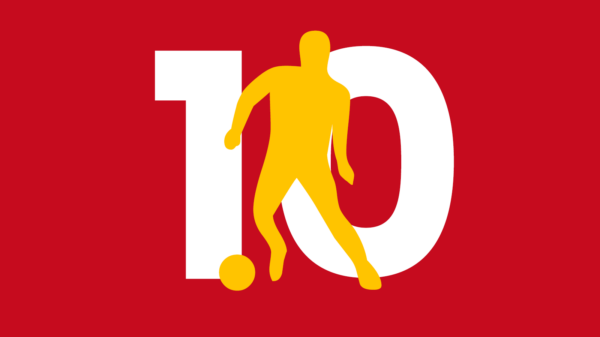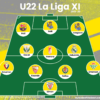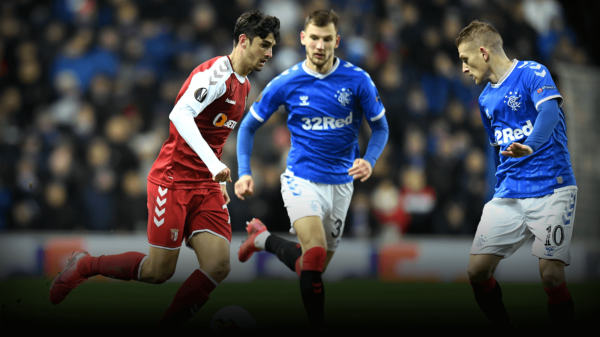La Masia has long been accepted as one of the world’s best academies and rightly so given their track record. However, as is true for any big club, academy graduates have to often compete with elite players for places in the side. Sergi Roberto is one such player who has found opportunities hard to come by. The youngster has slotted in at right-back after Dani Alves’ injury and he fits into the role of a Barcelona full-back says Alex Clapham.
Johan Cruyff brought many of the methods currently used by FC Barcelona to the club in the late 1980’s and during the world-shaking four year reign of Pep Guardiola, the ideas of his former Dutch manager ingrained in the club were well and truly on show for the world to see.
During the 1974 World Cup held in West Germany, the great Cruyff captained a Netherlands squad labelled as “The greatest team to never lift the World Cup” to the brink of success, only to lose agonisingly in the final to the hosts. The tournament showed a brand new concept of football to the world and captured both the imagination and the hearts of onlookers. The “Orange Machine” played a captivating style where the ball rarely left the ground, all players were technically comfortable and skill and ability were prioritised in a time where speed and physical strength were often preferred.
Amongst the short passing and patient build-up play was something that was completely unheard of; using the full-backs as a key part of the attacking game plan. Across the world, left and right backs were all so often the last positions to be filled. However, Ruud Krol (left back) and Wim Suurbier (right back) were seen gallivanting down the wings to provide support to the Netherlands wide men Rob Rensenbrink and Johnny Rep. They were key figures in the attacking moves and philosophies of coaches; Rinus Michels and Ernst Happel. This became a fad for many teams across the world, especially in South America. Guardiola played under Cruyff in Barcelona’s 1992 European Championship team in a role that is known in Spain simply as the “Number 6”.

As years have gone by, it has become more common to hear the position just in front of the defence and behind the midfield: the holding midfielder. Though much of Barca’s play commenced through Guardiola’s pin-point passing, he was predominantly there to break up counter attacks and offer support the defensive-line so that the full backs; Juan Carlos (left back) and Eusebio (right back) could have the freedom to offer an addition to attacking solutions and create from wide areas.
If the Dutchman laid the foundations, then Pep Guardiola most definitely built upon them and his system at Barca was certainly redolent of the flavour instilled in the club by Cruyff. Now Sergio Busquets has adopted the Number 6 position since being called up from the B team by Pep (to the dissatisfaction of many socios in the early days) and since then, neither the club nor football across the globe in general have ever been the same. Guardiola’s first season at the helm was record breaking. The team raced to a treble, winning the La Liga, Copa Del Rey and Champions League trophies. The coach who lives and breathes for FC Barcelona came in with a plan from the first day, upsetting many with decisions that dropped jaws around the world. In Pep’s first week he held meetings with both the magician Ronaldinho and his partner in crime Deco. The crimes were critical in Pep’s eyes and he released both players from the club as he wanted a togetherness in the group based on hard-work, spirit and sacrifice for one another. He felt that the Brazilians didn’t fit the bill in these areas.
Alongside striker Pedro, Busquets followed Guardiola from the B team and as a result was thrown right into the squad that had new faces, new style and most crucially, new visions. The Number 6 from Badia, Catalonia is like nothing seen before in Spanish football. Whilst having footwork that has the Barca fans raise to their feet in approval and a range of passing that can start an attacking move from nothing, “Busi” has the reading of the game and football mind that led Guardiola to quote “If I could come back and play as any player, it would be Sergio Busquets”.
Equally important as the ever-present Busquets in the world shaking triple season were full-backs; Eric Abidal and Dani Alves. The arrival of Pep gave a breath of fresh air to Abidal who had often been used as a central defender for coach Frank Rijkaard. Accompanying Alves down Barca’s flanks, the Frenchman supplied overlapping runs that resulted in opposition defences overloading on one side and therefore allowing space centrally that the quality of Henry and Iniesta all too frequently took advantage of. The arrival of the Brazilian right-back, Alves was a revelation and added an extra side to the already remarkable Lionel Messi who was only 20-years-old at the time. His timed runs and interchanges with the Argentine became a regular occurrence and Messi reaped the benefits of the freedom from roaming in a free role due to Alves’ support on the right, netting more than double the goals he scored the previous year.
Although the likes of both Guardiola and Abidal from the team viewed as “the greatest in football history” by many have departed the club, the methods most certainly have not. Now La Masia prodigy Jordi Alba occupies the left-sided position vacated by Eric Abidal and has chipped in with 23 assists since his re-arrival to the club in 2012. It has become a given amongst football fans around the world that the full-back partnership of Alba and Alves are a deadly asset to the current champions of Europe with Busquets supporting their forward play by retreating into a defensive role. Over the years, nobody has assisted more goals of the record holding Leo Messi than the Brazilian Right-Back, even with the passing genius of Xavi Hernandez and Andres Iniesta around.
A young man that has, for a frustratingly long time, taken a back seat amongst all the success at FC Barcelona is Reus, Tarragona born Sergi Roberto. Another local boy brought into the fold of the first team by Pep Guardiola, making his debut as a second half substitute in a 5-1 Copa Del Rey win against AD Cueta on 10 November 2010, four years after arriving at the club’s La Masia academy as a 14-year-old in 2006.
Originally a “Number 6” making 106 appearances and scoring 7 goals between 2009 and 2013 for Barcelona’s B team, Roberto has had game time to slowly ease into the first team plans over the last 5 years. At times being permitted to play in more advanced midfield roles, the Catalan has assisted 7 goals in his limited opportunities with the first team and scored 4, the first of which came in his first start for the seniors on 6 December 2011 against FC BATE Borisov in the Champions League group stage.
Sergi has been capped 39 times for the Spanish national teams between the age groups of U17 and U21s, including a call-up to the U17 squad for the 2009 World Cup in Nigeria where Spain finished 3rd. Roberto netted a hat-trick in a memorable win against Burkino Faso in the finals and he also has 4 caps for the Catalonia National Team.
Barcelona’s coach Luis Enrique has evidently been a big fan of Sergi since coaching him in Barcelona’s B team during the 2010-2011 season. 12 appearances were handed to the 23-year-old in a squad that boasted such supreme midfield quality, such as; Iniesta, Xavi, Busquets, Rakitic, Rafinha, Samper, Halilovic and Adama Traore during the treble winning term. Starting as the Number 6 in the 4-0 demolition of Almeria, Roberto stole the show and looked completely unfazed beside the great Xavi Hernandez and Ivan Rakitic in the midfield three to complete a man-of-the-match performance in front of the Barcelona faithful in the Camp Nou.
Following an impressive pre-season in the new horizontal stripes of Barcelona, including a goalscoring performance against LA Galaxy, the Reus-born man was the one trusted by coach Enrique to fill the Right-Back spot, replacing the injured Dani Alves in the first game of the season against Athletic Club. It was a surprise to many as the already proven, natural defender and Spanish international Marc Bartra was sat beside Roberto on the bench. However, the natural attacking prowess and passing ability of the latter was preferred and he entered the stage after just 19 minutes.
Sergi wasted took no time to settle into the game, applying pressure on left-sided Basque players Benat and Balenziaga at any given opportunity. Attacking with intent and providing an extra force alongside Rakitic and Messi down the right-hand side for Barca, there was a moment in the game where he cut inside and drilled a blistering shot from 25-yards-out that grazed the top of the crossbar. Defensively, he was sound and in a game where Barcelona regulars may have been wary having lost in the Spanish Supercopa final just days earlier to their infamous Basque rivals, Roberto showed not only his calm nature, level headedness and experience in such situations, but also his quality and defensive discipline to keep tricky winger and target of many English clubs Sabin Merino very quiet.
With the news coming back of Alves’ adductor injury keeping him out of action for upto a month, coach Luis Enrique will have felt as though he had no choice but to start Sergi Roberto in the Right-Back spot of the 4-3-3 formation against Malaga following his impressive display in the Basque Country.
With Sergio Busquets passing a fitness test and the return of Brazilian superstar Neymar before the first home game of the season, Barcelona lined up: Bravo; Roberto, Mascherano, Vermaelen, Alba; Busquests, Rakitic, Iniesta; Messi, Suarez, Neymar.
Malaga opted to sit deep and hope to punish the home side on the break, as most teams that come to the Camp Nou plan to do. However, unlike any other team that will entertain Barcelona in the league this season, they have kept a clean sheet against the Catalan giants in their last 2 meetings, including a spectacular 1-0 win at the home of the eventual treble champions. A win here would be no mean feat for the Blaugrana.
The hosts started relatively slow and Malaga’s 4-5-1 formation with two of the five midfielders sat in front of the back 4 doing a great job in frustrating Barcelona, restricting them to only 5 attempts on target in the first half which is strikingly low given their 70% possession score at half-time.
Completing a total of 12 overlaps of Barca’s right-sided midfielder Ivan Rakitic and an astounding 24 of both the Croatian midfielder and forward Leo Messi, Sergi was always an attacking option. He stretched Malaga Left-Back Miguel Torres away from central defenders and ultimately caused midfielders, Fernando Tissone and Duje Cop to tuck in and support the full-back. Messi and co. failed to use the option of Roberto often in the first half, even when he was in acres of space. This resulted in a lack of crosses into the area from wide positions, which was clearly an instruction from Enrique as Malaga’s central defenders Weligton and Marcos Angeleri are so aerially dominant.
During the second half, Barca’s number 20 saw a lot more of the ball, showing his confidence in his technical ability by completing 5 take-ons, including a shoulder-drop to change direction inside his own penalty area that Argentine colleague Lionel Messi would have been blushing with pride from. Completing 44 out of an attempted 46 passes to achieve a total percentage of over 95% is nothing that will come as a surprise to the Barcelona fans. A midfielder that has come through the La Masia academy works on their passing game daily for years and Roberto has sublime range and vision for a through-ball.
Like all of the Barcelona XI apart from central defenders Javier Mascherano, Thomas Vermaelen and Goalkeeper Claudio Bravo, Sergi spent more time in Malaga’s half than his own. Two crosses were fizzed into dangerous areas by Roberto, one overran everyone as it was just centimetres too high for Neymar to connect with at the far post and the second was a teasing cross that was agonisingly cut out by Malaga’s impressive Angeleri before reaching the outstretched right foot of predator Luis Suarez waiting to tap home. The clock was ticking and the fans were becoming restless. Attack followed attack and on the 70th minute mark, the ball fell to Lionel Messi who cut inside, yet again using Sergi’s run as a decoy to hit a rocket-of-a-shot with his left foot that sailed towards the bottom right-hand corner and beat everybody but Malaga Goalkeeper Kameni who once again kept Barca at bay with a strong left-handed save. Seconds later, a Rakitic corner evaded everyone in the box and landed at the feet of Sergi Roberto 40 yards out, to the left of the area. Showing great calmness yet again, he opted against attempting to deliver the ball into the crowded penalty area, but instead played a pass into the feet of Luis Suarez who was on the angle of the penalty area. Suarez duly beat Tissone and drilled a low cross that was yet again cut out by the Malaga Goalkeeper, only this time Thomas Vermaelen was on hand to volley home his first goal for the club and what turned out to be the match- winning-goal.
That was not the end of the drama though. The home fans around the stadium were yet to return their backsides to the seats following the goal when the scorer himself seemed to still be celebrating and was caught out of position when the ball got in behind him. The resulting cross was aimed towards Malaga’s Perez Lopez at the far post, however, Roberto showed a devastating turn of pace to match his reading of the game and snuff out the danger with a marvelously timed sliding tackle, which was his 7th interception of the evening. The stadium erupted just as loudly as they did moments earlier for the goal in support of their homegrown talent and this was another sign of the young man’s maturity and discipline. Roberto added another immaculate defensive performance to his repertoire, completing 4 tackles and winning all 5 of his aerial duels in a truly superb display.
The plaudits were out in force for the academy product, however, no words will have played so musically in his ears as the ones of his adoring manager, who stated; “Sergi is a very smart player, I’m happy to give him minutes because he deserves it and I hope it stays that way. I like everything of him, a player of very high intellectual capacity and one can play in different positions, you would think he’s played right-back his whole life.”
Being born in the year of Cruyff and Guardiola’s 1992 European triumph and having grown through the system that was put in place by the Dutch great plays an influential role in Roberto’s game. Having played as the Number 6 for so long, he knows all about the sacrifices needed to succeed, yet has the tactical nous and high level of technical ability to read the game and supply the quality required by his team in all thirds of the field.
With Dani Alves recently hitting the ripe old age of 32 and picking up injuries more frequently over the past seasons, Roberto has done himself no harm at all by showing how versatile he is and with Aleix Vidal not being permitted to play until January, there is no greater time for Sergi Roberto to kick on and show what he can offer to his boyhood club, whatever position that may be in.
Written by Alex Clapham
- Tactical Analysis: Bayern Munich 0-0 Borussia Dortmund (Pens 4-3) | BVB Press Breaks & Bayern Width - May 25, 2016
- Tactical Analysis: Atletico Madrid 2-0 Barcelona | Atletico close all the gaps to win - April 19, 2016
- Tactical Analysis: Borussia Dortmund 2-0 Porto | Dominant hosts ease to the win - February 23, 2016





























































